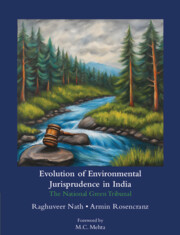Book contents
- Frontmatter
- Dedication
- Contents
- List of Images
- Foreword
- Preface
- Acknowledgements
- List of Abbreviations
- 1 Introduction to the National Green Tribunal: The Need for a “Green Court”
- 2 The National Green Tribunal Act, 2010: Analysis and Interpretation
- 3 Interpretation and Application of Environmental Principles
- 4 Evaluating the National Green Tribunal after a Decade: Challenges to Overcome
- Interview with Justice Swatanter Kumar
- Interview with Vimal Bhai
- Index of Cases
2 - The National Green Tribunal Act, 2010: Analysis and Interpretation
Published online by Cambridge University Press: 15 January 2025
- Frontmatter
- Dedication
- Contents
- List of Images
- Foreword
- Preface
- Acknowledgements
- List of Abbreviations
- 1 Introduction to the National Green Tribunal: The Need for a “Green Court”
- 2 The National Green Tribunal Act, 2010: Analysis and Interpretation
- 3 Interpretation and Application of Environmental Principles
- 4 Evaluating the National Green Tribunal after a Decade: Challenges to Overcome
- Interview with Justice Swatanter Kumar
- Interview with Vimal Bhai
- Index of Cases
Summary
The powers and functioning of the NGT are governed by the NGT Act, 2010. Accordingly, this chapter deals with the broad themes covered in the various sections of the NGT Act and highlights how the NGT has interpreted and expanded on various provisions contained therein.
2.1 PURPOSE AND OBJECTS OF THE NGT
As discussed in Chapter 1, the predecessors of the NGT – the NET and the NEAA – were dysfunctional and ineffective due to a lack of legislative will. Furthermore, the call for the need for environmental courts by the Supreme Court was augmented by the recommendations of the Law Commission of India. This has been specifically recognized in the Statement of Objects and Reasons (SOR) contained in the preamble to the NGT Act 2010. The SOR further recognized the need for expeditious disposal of environmental cases in light of the increasing number of pending cases in the higher judiciary requiring technical expertise. Accordingly, the long title of the NGT Act, 2010, provides the following purpose behind the establishment of the Tribunal:
An Act to provide for the establishment of a National Green Tribunal for the effective and expeditious disposal of cases relating to environmental protection and conservation of forests and other natural resources including enforcement of any legal right relating to environment and giving relief and compensation for damages to persons and property and for matters connected therewith or incidental thereto.
The SOR further states that the NGT Act, 2010, was enacted to uphold India's commitments under international conventions, such as the UN Conference on the Human Environment (1972) and the UN Conference on Environment and Development (1992), to take appropriate measures for enhancing environmental protection and access to judicial and administrative proceedings. This involves developing national laws regarding liability and compensation for victims of pollution and environmental damage.
Additionally, the SOR recognizes the judicial pronouncements declaring the right to a healthy environment as a part of the right to life under Article 21 of the Indian Constitution and emphasizes the need to adopt a multidisciplinary approach for upholding it.
Given this context, it is apparent from the preamble and the SOR that the NGT has been primarily envisaged as an adjudicatory vehicle, which can effectively and expeditiously give effect to the constitutional obligations contained under Article 21 of the Indian Constitution relating to the right to a healthy environment.
- Type
- Chapter
- Information
- Evolution of Environmental Jurisprudence in IndiaThe National Green Tribunal, pp. 31 - 198Publisher: Cambridge University PressPrint publication year: 2025

